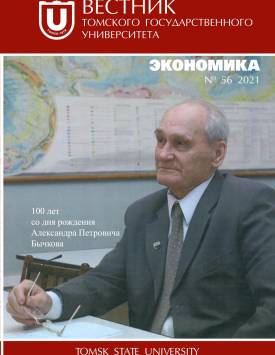Professor Aleksandr Bychkov’s Methodology of Economic Research
In connection with the 100th anniversary of the birthday of Professor Aleksandr Bychkov, the honorary worker of the Higher School of the Russian Federation, rector of Tomsk State University, long-term head of the TSU Department of Economic Theory, a study was conducted on the role of the methodological principle of the unity of the abstract a priori and concrete praxiomatic approaches in the creation of new economic knowledge, which he carried out for more than 50 years. The study of the problem of implementing this methodological principle in Bychkov’s works is based on the consistent solution of the following tasks: (1) substantiation of the significance of the methodological principle in the process of producing new scientific knowledge, (2) analysis of the implementation of this principle in Bychkov’s works on theoretical and praxiomatic problems of property, commodity production, the market, reproduction of the gross national product, and factors of economic growth. Professor Bychkov constantly created new economic knowledge based on the entire set of principles of dialectical-materialistic cognition of objective reality, among which the necessity of continuous interaction of scientific and economic knowledge and its use by economic entities in their activities was fixed in the principle of the unity of the abstract a priori and concrete praxiomatic approaches. The dialectical unity of the two approaches is achieved through the interaction of two types of connections: direct and reverse. There is a direct relationship between the main and mutually complementary approaches, and a reverse relationship between the mutually complementary and main ones. Depending on the object of cognition, one of the approaches becomes the main one, and the second becomes the auxiliary one. In the study of macrosystem objects and their sets, the abstract a priori approach performs the function of the main one, while in the study of intrasystem processes, structures, institutions, the concrete praxiomatic one. The use of the principle of the unity of the abstract a priori and concrete praxiomatic approaches allowed Professor Bychkov to create a new economic knowledge about the essence of property relations, commodity production, and the market, about the factors of economic growth, and at the same time to show their features in the economies of the USSR and RF in the period from 1950 till 2009.
Keywords
methodology, principle, unity, approaches, abstract a priori, concrete praxiomatic, research, new knowledgeAuthors
| Name | Organization | |
| Tsitlenok Vladimir S. | Tomsk State University | vladim.tsitlenok@yandex.ru |
References

Professor Aleksandr Bychkov’s Methodology of Economic Research | Vestnik Tomskogo gosudarstvennogo universiteta. Ekonomika – Tomsk State University Journal of Economics. 2021. № 56. DOI: 10.17223/19988648/56/1
